
Do young people give priority to environmental issues?
In your opinion, should environmental issues be prioritized over other societal issues (culture, health, immigration, economy, etc.)?
In order to learn more about the place given to ecology in society, we asked our respondents about the level of priority they attribute or would like to be given to the environment compared to other areas of life such as health or the economy.
1. Environmental issues and public health
In our quantitative survey, which is representative of the French population, our results show that 26% of the general population agree with the statement “priority must be given to the environment, not to public health”.
Read more…
By isolating the younger population (15-24 years old), we observe that 35% of them agree with this same statement.
Pie chart: “Priority must be given to the environment, not public health”.
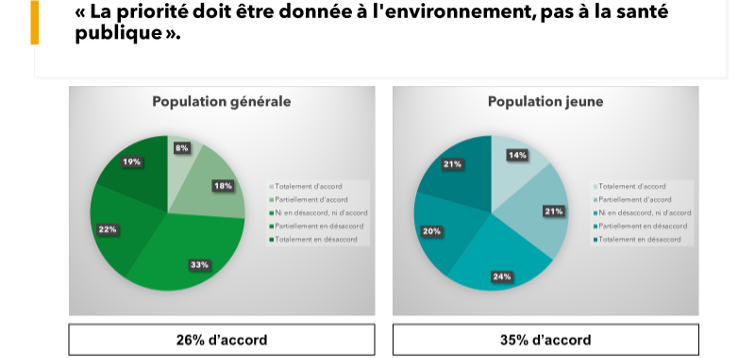
And what is your opinion on the matter?
2. Environmental issues and the economy
We asked respondents to the quantitative survey to tell us if priority should be given to the environment rather than the economy. The tendency to prioritize the environment is more important here than in the case of public health.
Read more…
38% of French people are of the opinion that the environment should take precedence over the economy. It should also be noted that 51% of all young people aged 15-24 agree with this idea.
Pie chart: “Priority must be given to the environment, not the economy”.
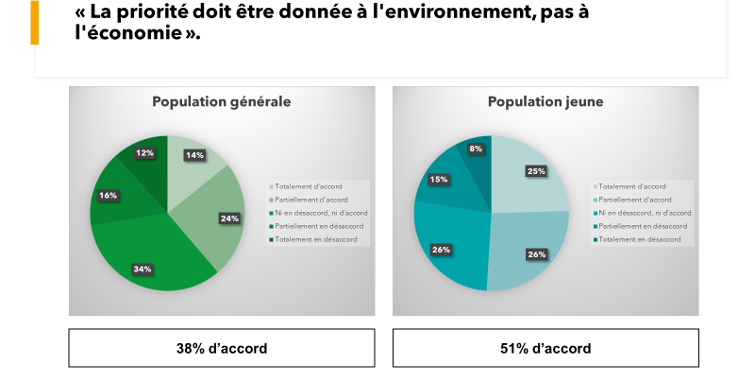
In our qualitative survey, the engaged people we interviewed overwhelmingly answered yes to the following question: “Do you think the environment is more important than the economy?”. By asking them to explain their opinion on this subject, we were able to identify two different positions. In both cases, they think that the environment is more important than the economy, but:
- For the first group, it is because ecological problems are a priority therefore it is urgent to take them into account.
- For the second group, society should be based on a model which combines the economy and ecology. They believe that the current economic model, which they describe as capitalist, cannot be combined with ecology, but by using another economic model that is more respectful of the environment and humanity; it is possible.
Here are some sample responses we collected for the following question: “Do you think the environment is more important than the economy?”
“A: Yes. […] So here yes, because the economy is based on capitalism, the current economy is based on capitalism, and capitalism is destructive in relation to the environment, so yes, that is more important. But, the economy in the sense that people can live again, that we can run hospitals, etc., I would like to be able to say that a ton of money would be ideal, but obviously that’s not going to happen, but the economy in this sense, I think it comes down to the social cause, which is also linked to the environmental cause. There’s a slogan that says, “End of the month, end of the world, same fight.” And that actually sums it all up. From this point of view it is not more important, but I think that there is a way to reconcile the two. From a money making perspective, capitalism, etc., there on the other hand, I don’t care if to be honest, if Airbus loses money, except if it impacts employees who lose their jobs, but otherwise … To make more or less money honestly…”
Lou, 16 years old, eco-engaged
“A: Undoubtedly, but it depends to what extent. Doing environmental things that will create massive unemployment and disastrous living conditions for the poorest, I’m not for it, but doing things for the environment that would be horrible for shareholder profits, for sales globally, and even for GDP, I have absolutely no problem with that.”
Léonie, 19 years old, eco-engaged
“A: Does there really need to be any significance between the two? Couldn’t we have a model that ultimately combines economy and ecology? To have a new model and which ultimately would not be like this one but where there would not necessarily be one that takes precedence over the other. I don’t think so, because the economy also allows people to live, in any case the economy has always existed, market exchanges are not something that will disappear eventually, so we must rethink the economy whilst taking into account ecology”.
Claire, 23 years old, eco-engaged
In this context of a health crisis, do you think that for the French, environmental issues have been sidelined?
YES
Our study showed otherwise! Our results show that the health crisis does not necessarily lead to environmental issues being relegated to the background. This has even led some French people to want to get more involved in the protection and defence of the environment. Our results will show why…
NO
Absolutely! Our results show that the health crisis does not necessarily lead to environmental issues being relegated to the background. This has even led some French people to want to get more involved in the protection and defence of the environment. Our survey results will show why…
58% of citizens plan to change their behaviour in favour of the environment in 2022
To find out more: click here !
Why has the health crisis encouraged young people to get more involved?
The health crisis is a favourable context for reinterpreting one’s relationship to the environment. In prioritising various societal challenges, our results show that the health crisis does not necessarily lead to environmental issues being relegated to the background since 50% of French people and 53% of young people aged 15-24 believe that is proof that “priority must be given to environmental issues”.
Read more…
Pie chart: “The health crisis shows that priority must be given to environmental issues”.
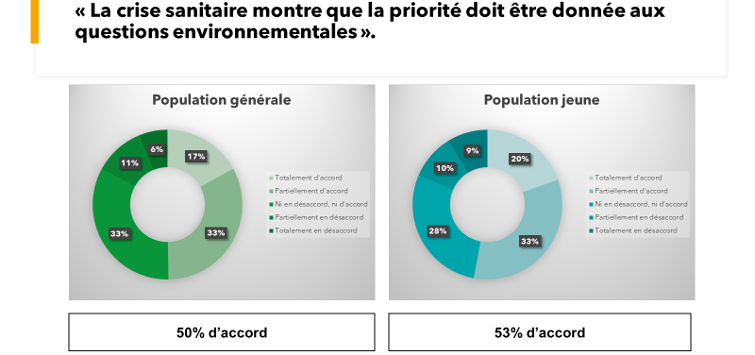
Moreover, the French believe that the health crisis has reinforced their sense of responsibility and their desire to be committed to the environment.
51% of French people and 55% of young people aged 15-24 state that since the health crisis, they feel even more responsible for the environment and the future of the planet:
Pie chart: “Since the health crisis, I feel even more responsible for the environment and the future of the planet”.
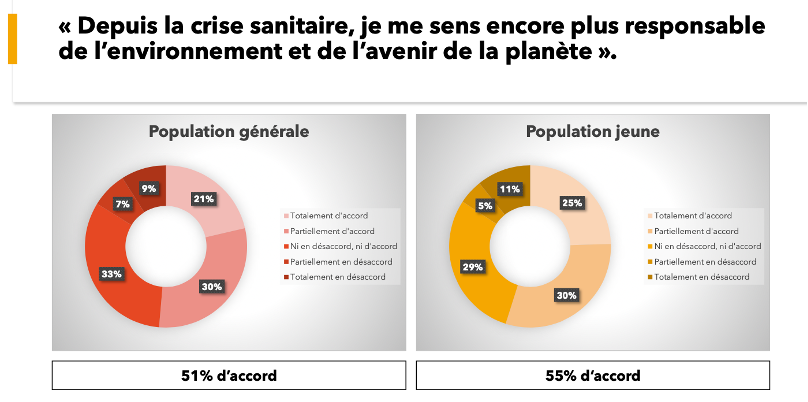
In addition, 44% of the entire French population and 53% of young people aged 15-24 say that the health crisis has reinforced their desire to be involved.
Pie chart: “I think the health crisis has reinforced my desire to be committed to the environment”.
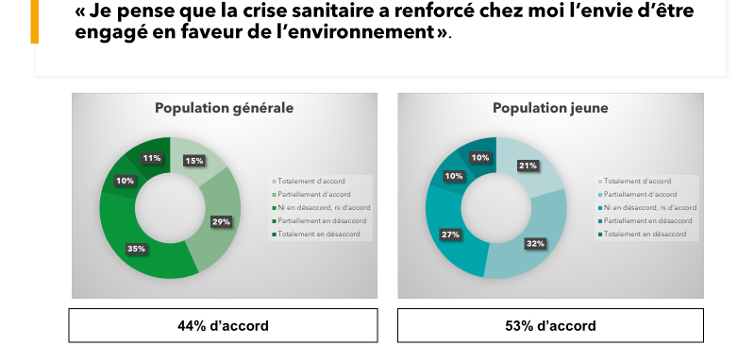
The young eco-engaged people we interviewed in our qualitative survey almost unanimously validated the idea that the health crisis made them want to commit more to the environment.
Our study has highlighted three elements that encourage the desire to get involved:
1- Les effets positifs du confinement sur l’environnement
Some respondents noted an “improvement” in the ecological situation during the lockdown. Many activities were put on hold, which gave them hope and encouraged them to become more involved in protecting the environment.
Read the words of Xali, 18 years old
“Q: And has the health crisis made you want to engage in a sense of engagement building?
A: “Yes completely. We saw at the beginning a real change of the climate in relation to the atmosphere. The pollution in China decreased completely, the birds were returning to towns and with the resumption of human activity everything has resumed its normal course, and that people can see the blue sky again and everything is the same. I have a new urge that is strong”.
2- Awareness of the harmful effects of humans on the environment
For other respondents, the health crisis has triggered an awareness of the consequences of a lack of respect for the environment. This awareness then leads to the implementation of new eco-responsible practices and / or the strengthening of existing practices.
Read the words of Dani, 17 years old
Q : And has the health crisis made you want to engage in a sense of engagement building?
A: “Yes! It’s since the health crisis that I’ve been trying to reduce my meat consumption, to replace meat with soy, so yes, but for what reason I don’t know. But I would say maybe an awareness of how dangerous it could be to not be able to respect the environment.”
3- The increase in free time during lockdown
For others, it is more the lockdown, rather than the health crisis, which has proved to be a favourable moment for the intensification of environmental sensitivity. Lockdown has led, for some, to an increase in free time which is at the origin of new approaches to information on the environmental issue and/or militant engagement.
Read the words of Léonie, 19 years old
A: “In fact, the health crisis for me has also been linked to a strong politicization. At the same time, I began thinking politically about other subjects, I started to get involved in a political party, so the health crisis for me was the moment I had a political dawning because I had a lot of time to read too, the time to think, to analyse, to call people to try to discuss politics with them, and to try to learn how to position myself. For me, the health crisis is something that made me want to act more and today it’s not over. And when I already see that there are plenty of people struggling and that there are plenty of people who can’t make ends meet, it shows me even more that these people won’t be able to act on an individual scale in terms of small gestures, and that therefore truly, in terms of ecology, it is time to act, to mobilize, and to believe in it a little”.
Did you have a similar experience during the health crisis that led you to want to get more involved in the ecological cause?
For further information
- ENQUETE IPSOS 2022 PUBLIC OPINION ON CLIMATE CHANGE. Online here
